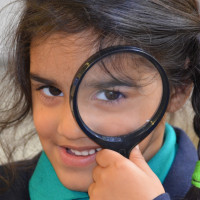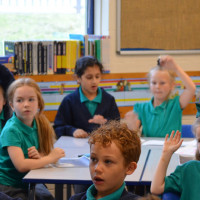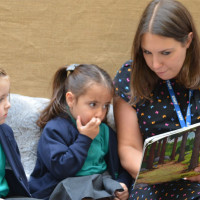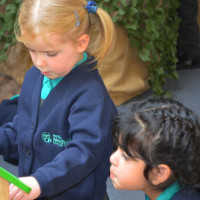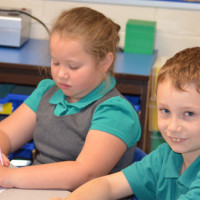Curriculum
Intent
We want our children to thrive in the world, with a curiosity for learning, compassion for others, self-awareness, and the belief that they can make a difference to their community. Our school curriculum is designed to give every child the knowledge and cultural capital they need to achieve this ambition.
Our ambitious curriculum:
- Provides full coverage of the National Curriculum
- Has reading at its core, enabling all children to access the broader curriculum and underpin essential life skills
- Is sequenced and planned so knowledge and skills are taught cumulatively from EYFS to Y6
- Begins with high-quality teaching of basic skills: reading, writing, maths, communication, and language
- Teaches in subject domains for English and Maths. In EYFS and KS1 foundation subjects are taught within thematic Learning Challenge lessons moving to more discrete subject domains in Y3 to Y6. This approach ensures breadth and depth of knowledge across all year groups so all children ‘know more and remember more’
- Nurtures children’s learning behaviours and develops a curiosity towards the exploration of knowledge
- Ensures children know right from wrong and how to keep themselves safe
- Explicitly teaches an acceptance of diversity through our ‘no outsiders’ ethos
- Supports SEND children in acquiring knowledge and skills with increasing fluency and independence by adaptation of the curriculum and the use of carefully chosen and measurable interventions
- Is planned and delivered using research-based pedagogy that allows consistency across school, enabling children to progress seamlessly across year groups and allowing a greater focus on the teaching of powerful knowledge which links across subjects.
- Nurtures and develops the whole child through our four contextual ambitions for our children: possibilities, initiative, diversity and community
Implementation
To ensure the curriculum is accessible to all and ensure children ‘know more and remember more’ it is implemented using carefully evaluated schemes of learning and research-based evidence.
Knowledge and Skills:
To ensure subject progression of knowledge and skills across all areas of the curriculum, we increasingly teach subjects discretely as children move through EYFS, KS1 and into KS2. This ensures children have the opportunity to become experts in each subject area as they move into secondary school. English and Maths are taught discretely daily throughout school predominantly across the morning timetable. Foundation subjects from EYFS to Y2 are taught thematically through Learning Challenge to enable children to make links in knowledge and teach skills progression across subjects. Developing on this approach, in KS2 more subjects are taught discretely for children to deepen their knowledge and become experts. The exceptions are History, Geography and Art which are delivered within Learning Challenge lessons which have an overarching thematic question. All areas of learning are underpinned by strong subject knowledge to ensure teaching is developmental and builds on the prior learning of pupils.
The knowledge for each subject domain has been explicitly planned by leaders to cumulatively build as children progress through school. This enables teachers to focus on pedagogy, adapting the curriculum for SEND pupils and ensuring children ‘know more and remember more.’ When designing sequences of learning across the curriculum, we ‘start with the end in mind’ by clearly identifying the learning outcome. Learning is then designed in small progressive steps enabling distributed practice and mastery of the knowledge and skills being taught. All curriculum resources and schemes of work are carefully chosen to serve the school’s curricular intentions and enable effective curriculum implementation.
Pedagogy:
The school has a research-based pedagogy through which knowledge and skills are taught. This enables the curriculum to be delivered consistently across all year groups. Lessons begin with a review of prior learning to develop children’s understanding of what they have learnt, consolidate knowledge into their long-term memory and reduce cognitive overload for new learning. Teachers use the ‘Beckfoot Nessfield Top Five Strategies for Review’ to ensure consistency of approach.
We know from research that the size of a child’s vocabulary is a strong predictor of how well they achieve at the end of Y6. Vocabulary teaching is carefully planned across the curriculum and is not a one off, word of the day activity. We use direct instruction within lessons to ensure new words are taught deliberately and explicitly. This is partnered with indirect instruction in the classroom with adults modelling rich vocabulary and academic talk (talk like an expert) and rich reading experiences.
When teaching new knowledge and skills, teachers ensure children efficiently acquire, rehearse and connect prior knowledge by providing sufficient instructional support. Based on educational research, we give children effective support by breaking down new material into manageable chunks, modelling and scaffolding learning, guided practice (I do, we do, you do), helping children when they make errors, providing for sufficient practice and effective reviewing.
Assessment:
Checking for understanding and the use of effective questioning is an integral aspect of our pedagogy. It enables teachers to formatively assess knowledge in order to close gaps. By checking for understanding after each small step, teachers effectively identify and address misconceptions in children’s understanding. The review at the start of a lesson also enables teachers to assess children’s understanding.
Teachers use summative assessment at the end of each stage of learning to inform teacher assessment. We use a range of summative tools to gain an accurate picture of children’s knowledge and plan for the next steps in learning:
- Mathematics Mastery: diagnostic pre and post unit assessments; end of term assessments.
- Phonics: Little Wandle Letters and Sounds Revised fluency and decoding assessments
- PIRA reading assessments Y3 to Y5
- PUMA: maths assessments Y3 to Y5
- Y2 and Y6 SATs
- Collins benchmarking for reading
Impact
We use regular and robust triangulated monitoring to evaluate the impact of our curriculum design. Leaders review learning, talk with our children and provide feedback to move practice forward. We track children’s attainment and progress to ensure they are in line or exceeding their potential. This is achieved using national data (where appropriate), our curriculum schemes of learning, Trust KPI documents and monitoring evidence.
Our curriculum ensures that we develop well-rounded citizens with a clear understanding of values such as kindness, responsibility and friendship. Our ‘no outsiders’ ethos addresses negative stereotyping through investigating similarities and differences, and promoting acceptance, diversity, citizenship and human rights.
Learning dispositions are developed and children are intrinsically motivated which leads to success both now and in the future. Children demonstrate greater levels of resilience, motivation and a growth mind set when faced with different types of challenge. They develop attitudes and dispositions to make a positive contribution to the world. Our children are intrinsically motivated to be successful Our daily interactions provide a regular check on this and success across the wider areas of the curriculum reflect this.

